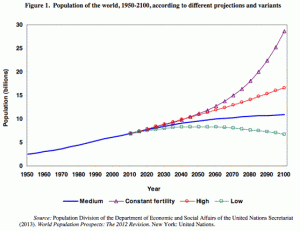Is Humanity Above Nature or Part of Nature?
Sep 19th, 2013 | By admin | Category: Environment/SustainabilityBy Suzanne York, www.howmany.org
A recent op-ed in the New York Times titled Overpopulation is not the Problem takes an “interesting” position on the topic of population growth and the environment.
The author, Erle C. Ellis, a geography professor and biologist by training, wrote, “The conditions that sustain humanity are not natural and never have been.” Not natural? The conditions that sustain us are resources that come from the planet itself. Plants and animals, and oh yes, fossil fuels. All of this comes from nature, and most people depend on such resources to in their everyday lives.
This past August many environmentalists recognized Earth Overshoot Day – a day when global resource consumption for the year exceeds the planet’s ability to replenish its natural capital. Humans are surpassing the annual carrying capacity of the earth earlier every year.
So despite the fact that our global society is using about 50 percent more resources each year than the earth can replenish, Professor Ellis disagrees and seems to disregard the increasing number of scientists who believe humans are degrading the environment and transforming the planet.
Certainly he is entitled to his belief that a growing population isn’t the problem, but in the face of pressing global problems such as ocean acidification, loss of precious topsoil, depleted aquifers, and deforestation and much more, it is hard to ignore the impact of humankind on the environment.
And what about the web of life? Humans are altering the planet, to such an extent, that the fate of all life is unknown. And if he is wrong, there is no Planet B to turn to, to rectify mistakes.
Professor Ellis expanded on his above view of humanity being above nature, writing, “The idea that humans must live within the natural environmental limits of our planet denies the realities of our entire history, and most likely the future. Humans are niche creators. We transform ecosystems to sustain ourselves. This is what we do and have always done. Our planet’s human-carrying capacity emerges from the capabilities of our social systems and our technologies more than from any environmental limits. ”
Technology may save humanity, but it’s best to not put all our eggs in one basket. Even better is to recognize homo sapiens’ relationship with nature, and appreciating how it has sustained us despite our still growing population projected to be between 8 and 11 billion by 2050. And we should also remember that most high-tech gadgets rely on rare earth metals that yes, come from nature.
Below is an excerpt from a response by Dave Gardner, of the Growthbusters project, who does a nice job capturing the incredulous response of many people to the Ellis op-ed:
Erle C. Ellis tells us he was “trained as a biologist,” but there are ample reasons to wonder. This op-ed in Saturday’s edition of the New York Times flies in the face of science. We try to be gentle in our criticism of pro-growth bias, recognizing we’ve all been programmed since birth to believe that growth is good, we can grow forever, and technology will solve pesky little problems like providing food and water for 7, 9, 10 billion or more of us. …The views expressed in this op-ed are inexcusable coming from a “scientist.”
Hopefully we will have a world in 2050 with a global society based on well-being, happiness, and respect for all human rights, that is in balance with nature. But if people like Professor Ellis continue to assume that we are above nature and are not sustained by it, then we are in trouble.
Suzanne York is a senior writer with the Institute for Population Studies.



Ladies and Gentlemen,
Scientists warn of a rapid collapse of the Earth’s ecosystem.
The ecological balance is under threat: climate change, population growth and environmental degradation could lead even in this century an irreversible collapse of the global ecosystem.
–> http://newscenter.berkeley.edu/2012/06/06/scientists-uncover-evidence-of-impending-tipping-point-for-earth/
The cardinal reason is the sudden development of human population that threatens to devour all our resources.
Since 21 August there is therefore a petition at change.org for the introduction of global birth-controls, also in HINDI!
If you want to support this or publish it on your website, here is the link:
http://www.change.org/de/Petitionen/weltweite-geburtenregelungen-verbindlich-einf%C3%BChren-introduce-obligatory-worldwide-birth-controls
Please continue to spread the link or the petition as possible to all interested people, organisations etc.
Thank you and best regards
Achim Wolf, Germany